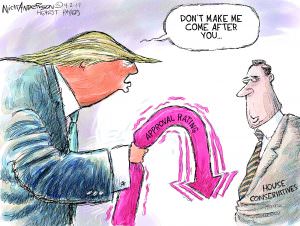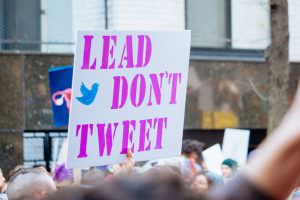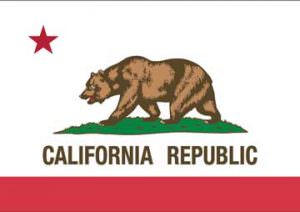Tough Love for Obama
The Wal-Mart moms were pessimistic, bordering on despondent, about the state of the country, but they were also surprisingly understanding about the president's plight.The Wal-Mart moms were pessimistic, bordering on despondent, about the state of the country. Like, well, moms dealing with bickering children, they were exasperated by Washington lawmakers seemingly incapable of learning to get along.
And they were surprisingly understanding about the president’s plight. Even those who did not vote for Barack Obama shied away from blaming him for the current state of affairs. If anything, they said they felt sorry for him.
I spent a fascinating evening last week listening via video hookup to focus groups, 30 women in all, in three battleground states: Pennsylvania, Missouri and Colorado. These were, literally, Wal-Mart shoppers — the retail giant sponsored the discussions — screened to exclude committed partisans of the left or right and split evenly between 2008 supporters of Obama and John McCain.
These were homemakers and teachers, dental assistants and billing managers. Most had at least some college education. All made less than $100,000 annually, most closer to $50,000, and for many the recession had hit painfully close, with husbands who had lost jobs and homes foreclosed or underwater.
All were likely to vote in November, although despite the intensity of the Senate races in their states, they were largely oblivious to the candidates. For all the partisan attacks lobbed at the Democratic and Republican congressional leadership, they knew little about House Speaker Nancy Pelosi and even less about Minority Leader John Boehner.
If I were a member of Congress listening to these women, I would have been horrified by their perception of lawmakers as elitists disconnected from — indeed, uninterested in — their concerns.
If I were a member of Congress up for re-election I would have been frightened by their hostility.
If I were the president, I would have felt relieved. Not great, but relieved.
Not because these women were going to vote for Obama. Even his 2008 supporters were, for the most part, unwilling to recommit. The word “disappointed” was used with regularity, along with some stronger language, such as “fraud,” and “scares me.” But these voters’ frustration with Obama was tinged with realism about the political and economic constraints he faces.
“I feel sorry for him,” said one woman at the first focus group, in suburban Philadelphia.
“I do, too,” interjected another.
“It’s a tough job to take on,” said a third. “I really don’t think who I voted for would have made a difference. The economy was in an unstable condition when he came in.”
In St. Louis, a McCain voter put it this way: “Poor Obama comes in and people expected him just to fix it all. People expected too much.”
It’s easy to forget, amid the angry clamor of the tea partiers and the carping of the disappointed left, that Obama’s approval ratings remain relatively strong; they are higher at this point than Bill Clinton’s and Ronald Reagan’s. If the focus groups are a guide, Obama has some time to prove himself to these voters. They are less enraged than unconvinced.
“It’s hard to trust him,” one woman in St. Louis said, but it turned out that what she meant was not that Obama wasn’t trustworthy — it was that she was uncertain that matters would improve. “A lot of things have happened since he’s been in office so we tend to blame him,” she said. “And things haven’t turned around very quickly, so what is going to happen next? You don’t know.”
Contrast this with the voters’ attitude toward Congress, which provoked words such as “juvenile,” “boneheads,” “quagmire” and “poison.” “They are so far removed from the working middle class,” one Philadelphia woman said of Congress. Said another: “They don’t go to the grocery store. They don’t know how to balance their own budgets.” Reactions to Sarah Palin were equally strong. “Joke,” one woman said. Another rolled her eyes.
Neil Newhouse, a Republican pollster who viewed the groups, said he was struck by these voters’ seeming patience with the president. “I’ve seen it before that people want him to do well. But the clear voicing of sympathy for the guy was a surprise for me. They feel sorry for what he inherited and what he’s got to deal with. … There’s frustration he hasn’t been able to figure it out. There’s a clear sense that he’s not the guy they voted for two years ago, but they still have hope that he can still be that guy.”
Whatever happens in November, Newhouse said, “To think that Obama’s toast in 2012, that is absolutely not the case.”
Ruth Marcus’ e-mail address is marcusr(at symbol)washpost.com.
© 2010, Washington Post Writers Group
Your support matters…Independent journalism is under threat and overshadowed by heavily funded mainstream media.
You can help level the playing field. Become a member.
Your tax-deductible contribution keeps us digging beneath the headlines to give you thought-provoking, investigative reporting and analysis that unearths what's really happening- without compromise.
Give today to support our courageous, independent journalists.






You need to be a supporter to comment.
There are currently no responses to this article.
Be the first to respond.